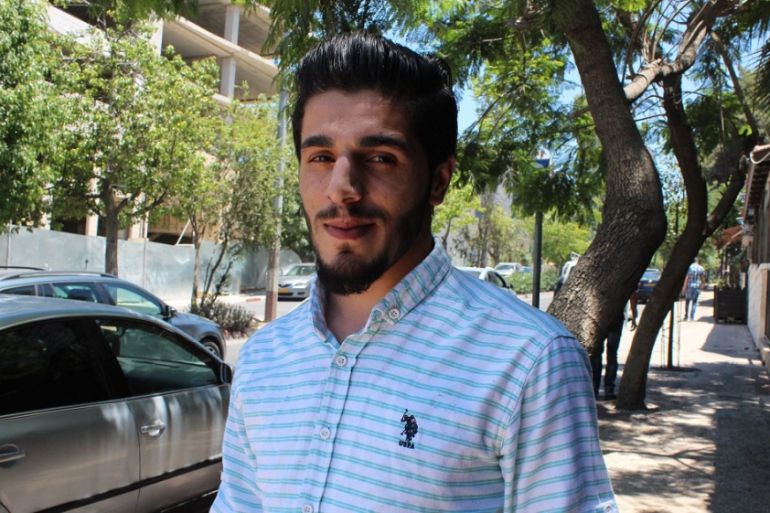PA crackdown narrows space for online criticism
Dozens of Palestinians have been arrested in recent years for social media posts criticising the government.

Ramallah, occupied West Bank – On a bright summer morning in a Ramallah cafe, Nassar Jaradat squinted at the screen of his battered smartphone, searching for the Facebook post that landed him in jail.
“I have not deleted the post that led to my detention. It’s still on my Facebook page,” he told Al Jazeera, his tone part defiant, part incredulous.
Keep reading
list of 4 itemsUS, EU impose new sanctions on hardliner Israeli settlers
Palestinian Prisoner’s Day: How many are still in Israeli detention?
The Take: As missiles fly above, settler violence surges in the West Bank
Jaradat was released on bail last month after spending 15 days in the custody of Palestinian Authority (PA) security forces at a Ramallah compound. The post in question was critical of Jibril Rajoub, a senior official who heads the Palestinian Football Association and is also secretary of the powerful Fatah central committee.
In an interview with an Israeli television channel on June 3, Rajoub spoke about the future status of contested holy sites in Jerusalem’s Old City, suggesting that in the event of a political deal between Israelis and Palestinians, Israelis would have control over the Western Wall, while Palestinians would control Al-Aqsa mosque compound.
READ MORE: The Palestinian Authority’s war on Facebook dissent
The next day, Jaradat, a 23-year-old activist, posted a message to Facebook stating that Rajoub had no right to make concessions on behalf of the Palestinian people. It received a few hundred likes and a handful of comments and shares.
Then, in the early hours of June 7, as Jaradat was spending time with friends in Birzeit, he received a phone call from his alarmed father: PA security officers had come to the family home in Beitunia to arrest him. He returned home to find the officers waiting for him and was promptly taken to their occupied West Bank headquarters for questioning.
“They had printed out my Facebook post,” Jaradat told Al Jazeera. “They asked me if it was mine or if someone else wrote the post. I said it was mine; I wrote it. They asked me if I felt guilty or if I felt that I had done wrong, and I told them I don’t.”
After Jaradat admitted to writing the post, the scope of the interrogation broadened to include some of his previous social media posts and his volunteer work with a Palestinian youth organisation, the Youth Pulse Forum, which aims to give young Palestinians a platform for free discussion of social and political issues. It also organises events throughout the occupied West Bank, including lectures and community projects. During this spring’s mass hunger strike, dozens of young Palestinians responded to the group’s call for a demonstration in Ramallah’s Manara Square.
|
|
“The interrogation was not just to play with me or waste my time,” Jaradat said. “They wanted to find out who in this group is the most influential, who can get this many people to go to a demonstration.”
Jaradat was charged with two offences: one count of inciting sectarian conflict and one of insulting a senior public official. With his next court date set for September 18, he has been released on $1,400 bail.
“It is a clear message that you have to stop writing posts. If I do it, they will come to arrest me and I will have to pay that,” Jaradat said. “I will continue to express my views, but not in a way that they can use against me and accuse me of violating the law. I will try to be more careful and consider the legal side.”

Palestinian and international rights groups have warned of a worsening crackdown by the PA against social activists and journalists in the past two years, which has created a chilling effect on freedom of expression online.
The Palestinian media freedom group MADA recorded a total of 134 cases in 2016 where Palestinian authorities in the occupied West Bank and the Gaza Strip infringed on journalists’ free expression, down from the previous year’s total of 192 – a decrease that the group attributes to a more stable political situation, but still an increase from previous years (114 in 2014, 78 in 2013 and 74 in 2012). The Independent Commission on Human Rights recorded 17 arrests by Palestinian authorities in the West Bank and Gaza related to critical social media posts throughout 2016, compared with 24 in 2015.
Nadim Nashif, cofounder of 7amleh, a Palestinian digital rights group, told Al Jazeera that the PA was unfairly targeting individuals who expressed legitimate criticisms of politicians.
“The general feeling is that the PA, in the last year or two, has become less and less tolerant,” Nashif told Al Jazeera. “I think they are feeling more intimidated. The end result and the feeling is that the margins and freedom of expression have narrowed in the past two years, which means also that any criticism towards the Palestinian leadership in the West Bank is not tolerated at all.”
READ MORE: Palestinians protest over PA-Israel security ties
During Jaradat’s jail stint, the PA became embroiled in a new fight over freedom of expression when it blocked 11 popular Palestinian news websites.
The sites were allegedly affiliated with Hamas, which controls the Gaza Strip, and Mohammed Dahlan, an exiled, Fatah-aligned politician and critic of the PA. The move to block the sites was condemned by rights groups, including MADA and 7amleh.
Nashif described the developments as “disturbing” and “sad”.
“I think they [the PA] are taking legitimacy from what is happening in the region, because this is becoming the standard in all the Arab countries, to block sites,” he said. “Sisi is doing it for almost 70 sites. There are many in Jordan … It is happening in many Arab countries, but on the Palestinian level this is the first time.”